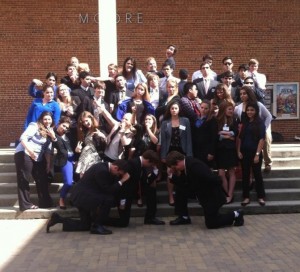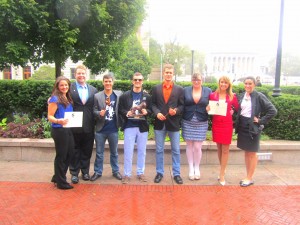Here at Best Delegate, our goal is to be the number one resource in Model UN knowledge for students and teachers. In order to help high schools and universities build up their own teams, we’re getting personal with a few teams on the circuit to see how they’ve found their edge in the competition.
Over the past three years, University of Florida has gone from snagging a few awards at more local conferences to winning delegation awards at top conferences. Head delegates Chris Joyce, Troy Robinson, Aaron Kalafarski, Sarah Huestis, and Fred Kolb attribute their success to the ability to compete on the circuit, a large and eager underclassmen base, and a bit of #GatorNation ingenuity.
University of Florida is not the first team to compete in both the National and World divisions, but they are one of the first to excel and have an exceptional presence on both. How do they do it? They separate the circuits, assigning them different purposes.
“We view the National Circuit as the ideal area to hone and mold delegate assembly skills; as the National Circuit places a greater emphasis on delegate education and overall delegation performance. We utilize National Circuit conferences to develop our delegates skills for the World Circuit, which seems more and more to rely on crisis-style committees,” said Robinson
This “divide and conquer” strategy helps the team get the most out of MUN and improves focus in committee itself. Most delegates who compete or have competed in both general assemblies and crisis committees know that each requires separate training and mindset. As well, instead of using World division conferences for training, this allows UF to send new delegates to master the National Circuit before jumping into the World Division.
Training is an integral part of UF Model UN’s overall strategy, especially considering their large base of underclassmen. As mentioned, the head delegates send most of them to conferences on the National circuit. This past year, UF sent 45 delegates to the Regional Training Conference in Tallahassee with over half new to MUN. Gradually, they bring more and more younger delegates to World division conferences like CMUNNY and UPMUNC. Their hard work paid off this fall with a Best Small Delegation at CMUNNY and five awards at UPMUNC, with two of the awards given to underclassmen.
Head delegate Chris Joyce highlights the main reason for this philosophy. “We believe the key to having a successful competitive program over the long term is to make sure you have able delegates to replace your veterans. Our goal is to make sure that when people like Troy Robinson, Fred Kolb, and Aaron Kalafarski graduate over the next two years we can just reload and continue performing at a high level on the circuit,” said Joyce.
Finally, it is impossible to truly excel on the circuit without an edge. A number of teams have proper training programs, strategies, and underclassmen; however, it is hard to match UF’s level of creativity. On and off the circuits, chairing or competing, University of Florida’s ingenuity permeates into all of their activities.
This year’s bold endeavor is a twenty-four hour crisis simulation at the third annual Florida Crisis Simulation from February 21-23, 2014. The committee, cleverly named “24”, will test delegates’ limits by operating entirely in real time. Paul Ryiz, one of UF’s most experienced directors will serve as crisis director for this application-only committee.
But Joyce said the most important way to showcase their individuality is by improving committee, whether competing or directing. Joyce said, “the best compliment that I can receive about one of my team members is that they made a committee experience better for the other delegates in their room.”
Landing comfortably in the top 20 this fall, it is clear UF’s strategy has paid off. In one year, they climbed nearly ten places, starting at #25 in Fall 2012 and finishing Fall 2013 at #16. Where to next? Robinson cites a more aggressive Spring 2014 schedule with more World division conferences including ChoMUN, MCMUN, and VICS.
If we can learn anything from University of Florida’s top-ranked team, creativity and playing to your team’s skills can never go amiss.



